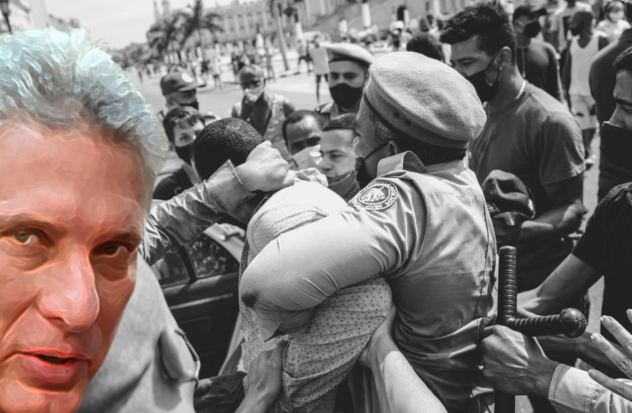The time elapsed in compliance and the sustained conduct in prisons are elements that reaffirm that a good part of these protesters are in a position to receive a favorable judicial decision that implies their freedom.
How to act, then, against the pattern of denial of conditional release and suspension of correctional work with confinement arbitrarily imposed by the political authorities of the regime. For many of these political prisoners and their families, the inequality in the treatment received by a person convicted of a common crime is inexplicable, regardless of the act committed or the consequences produced, and a person convicted for reasons of political repression, reports Diario de Cuba.
The former president of the Provincial Court of Villa Clara, Edel González Jiménez, maintains that “the subordination of the judicial system to the political power of the Island is the fundamental cause of the denial of release rights to prisoners, who are victims of the phenomenon of criminalization for political reasons. Abuse and discriminatory treatment will end when the Cuban judicial system is part of a real rule of law.
“Pattern of repression”
The political criminalization of the regime implies dynamics that penalize civic behavior, the arbitrary prosecution and prolonged imprisonment of citizens labeled as “enemies”, as well as the curtailment of prison rights.
“The construction of crimes is common and that is why political control is necessary in all phases of the criminal process,” highlights González Jiménez.
Those imprisoned for the exercise of their individual political freedoms are victims of arbitrariness both due to the criminalization of the exercise of their rights and in penitentiary establishments. Political prisoners are retaliated against through denial of benefits that the law grants them, such as telephone calls, reduced sentences per year served, family visits, transfer to less rigorous penitentiary centers and access to basic health services. and a correct diet, said the jurist.
At least 220 sentenced to sentences ranging between three and six years in prison suffer from the aforementioned pattern of repression imposed by the political power of the Island. These people, detained around 11J, have so far served at least half of the sentence, although in some cases that time increases to almost the entire sentence.
This figure represents approximately 87% of all those protesters sentenced with similar sentences and with the possibility of being released, which confirms the discrimination and unequal treatment denounced by both inmates and their mothers, family members and friends.
At least 40 of these 220 will serve their full sentence on July 11, 2024, a fact that demonstrates a harmful practice of repression.as well as the insensitivity of the regime, since among these people there are sick people, women and young people without criminal records.
“The phenomenon of the denial of prison rights and benefits did not appear after 9/11 and does not only affect protesting inmates. The harmful practice is a regrettable constant that judges must resolve,” argued González Jiménez.
Release
According to the jurist, the percentage of release of those deprived of liberty for common crimes in 2018 amounted to 89% of inmates with rights to conditional release, due to the prison drainage policy directed by the highest political and State leadership to the courts. .
Jiménez explained that this means that, of every 100 inmates with the right to be released before serving their sentence, 89 were released and 11 were not. Among those who came out were rapists, murderers and criminals of all kinds, except for dissidents, human rights activists and people who responded.
“This data had been confirmed in similar figures since years prior to 2018 and has continued to be confirmed as an approximate annual average in subsequent years,” according to official sources to which the lawyer had access.
The above contrasts with the harmful treatment received by inmates stigmatized as “counterrevolutionaries.” Of 100 prisoners included in this category, 87 or more receive a resounding no, while 13 or fewer receive a yes. “The latter are, as a general rule, inmates who have benefited from showing repentance, from having agreed on various conditions with State Security officials, or from having served much more than the period required to receive freedom,” González Jiménez stressed.
This severity and discrimination has no other purpose than to dissuade citizens from exercising their rights and political freedoms against the regime. “The fate of the rights and benefits of inmates stigmatized as counterrevolutionaries, dissidents or political adversaries is not in the hands of the penitentiary administration, the prosecutors who oversee prison legality, or the judges with jurisdiction assigned to grant conditional release, suspension of correctional work with confinement or extra-penal leave,” said González Jiménez.
“All categories, including that assigned to the 11J protesters, are under the command and control of the State Security body specialized in ‘the progress’ of said person within the prison system. It is these officers exclusively and no one else who decides what right and benefit to deny or grant, as well as the cell, the type of prison and whether or not punishments apply,” he added.
Source: With information from Diario de Cuba

